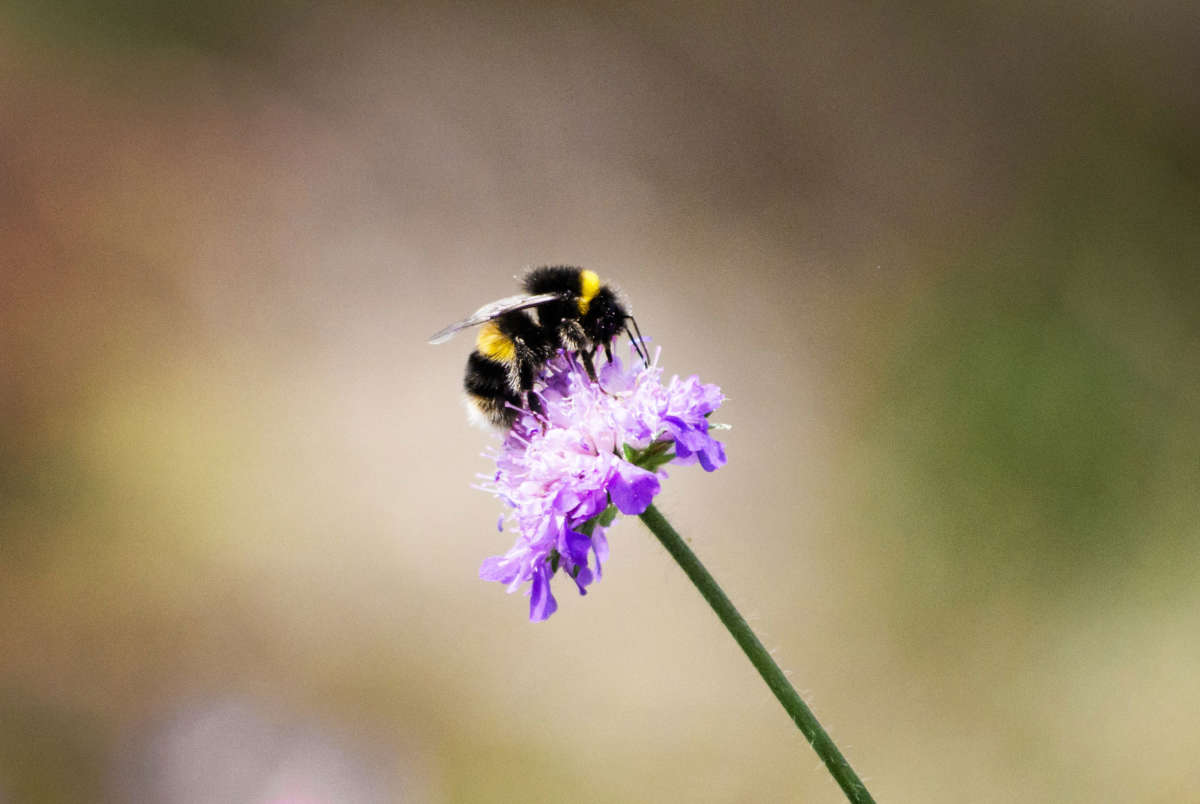Honest, paywall-free news is rare. Please support our boldly independent journalism with a donation of any size.
Amid the worry over the loss of honeybees, a far quieter but just as devastating loss is occurring among lesser known native bee populations. Wild native bees are vital to pollinate plants. Their populations are declining due to a warming climate, pesticide poisoning and lack of flowers and other environmental pressures.
As awareness increases about native bee death, some companies are taking advantage of public concern by touting their products as bee-friendly or making other claims. This marketing strategy, called bee-washing by critics, uses the plight of bees to mislead consumers. While many people are worried about honeybees, it’s also important to understand the jeopardy that native bees face.
My research explores the impact of a changing climate, specifically on the foraging behavior of native bees in Seattle public parks. More and more of my time is spent talking to the general public across the country about the dangers of bee-washing and the critical issues around bee decline.
Bees as a Branding Tool
Bee-washing is a term coined by researchers at York University in 2015 describing the use of bees by retailers to mislead consumers. Bee-washing is a form of greenwashing, a description conceived by environmentalists to define a marketing spin that persuades the public to think that a product is environmentally friendly. Examples of greenwashing may include green packaging or the term clean coal to deflect attention from a highly polluting process.
Companies and organizations use bee-washing to boost their image, taking advantage of the public’s lack of knowledge of native bees. First, some facts. The majority of bees are not honeybees, and only a few species of bees make honey. European honeybees, the cultivators of nearly 150 million pounds of honey produced in the U.S. in 2017 alone, are a domesticated bee species.
European honeybees are native to Europe and have been bred and transported worldwide for centuries. The U.S. imports European honeybees to pollinate crops. At the same time, there are 4,500 species of native bees in the U.S. And, while native bees don’t produce honey for human consumption, they are important pollinators and a vital part of our ecosystem.
Bee-Washing Blurs an Important Issue
Bee-washing tends to inflate the importance of honeybees. But the demise of native bees is also of great concern to scientists. Native bees are valuable pollinators and can serve as a buffer for agricultural crops in the face of honeybee losses. While their decline is concerning, if every honeybee in the U.S. were to die, we could simply purchase more overseas.
In 2017, General Mills ran an ad campaign to “save the bees” featuring the General Mills mascot, a honeybee named Buzz. The campaign encouraged wildflower plantings and sent thousands of free packets of wildflower seeds, branded with a picture of Buzz, to households across the country.
It’s true that native wildflower prairies are in decline worldwide. Yet the wildflower seeds were not separated by region and contained species that were non-native and invasive in much of the U.S. General Mills promoted their bee-friendly brand with honeybees but neglected to acknowledge the importance of native bees and native flowers.
Bee hotels are another example of an increasingly popular consumer item marketed as a way to help bees. The bee nesting boxes, ranging in price from US$15 to $50, are sold nationally from Costco to Amazon and promoted as a way to augment the natural environment for native bees. In reality, most species of native bees nest in the ground. Bee nesting boxes may even be detrimental to bees because they can carry diseases from year to year if not cleaned properly. Many versions are impossible to disassemble and clean adequately.
Bee-washing and erroneous facts about bees can also be found in social media posts by environmental groups. The Sierra Club, an environmental organization focused on preserving native landscapes, posted a tweet stating that honeybees are endangered. While honeybees face many threats including pesticides, disease and habitat loss, global stocks of honeybees are not endangered but are increasing.
Helping Bees Flourish
There are a number of ways to help native bees thrive. Planting native flowers is a good idea. So is reducing your use of pesticides and insecticides. Leave plant stems and dry debris in your garden as native bee habitat. Restore or preserve natural habitat. Support organic agriculture when you buy groceries. Organic farming aims to eliminate the use of pesticides that harm bees. I suggest skipping beekeeping and, instead, work on supporting the populations of native bees that already call your backyard home.
Need a few more ideas? The Xerces Society, a science-based nonprofit with a mission to protect wildlife, has created a certification process for farmers who support bee health. Look for the Bee Better Certified label at your grocery store. Volunteer with a local NGO focused on conserving native habitat or look at your local Cooperative Extension, which may have information about bees in your region. Remove invasive plants from your garden. Consider becoming a citizen scientist to help researchers gather bee data.
Be wary of products that will “save the bees.” Pay attention to which bee species advertisers are trying to save. But the absolute best thing you can do for the bees? Get out there and start learning about them. Pay attention to bees so you can identify them correctly. Plant a few flowers, see what bees show up, and find a bee cheat sheet to help identify each bee.
Disclosure statement: Lila Westreich receives funding from the National Science Foundation and the United States Department of Agriculture McIntire-Stennis Cooperative Forestry Research program.
Media that fights fascism
Truthout is funded almost entirely by readers — that’s why we can speak truth to power and cut against the mainstream narrative. But independent journalists at Truthout face mounting political repression under Trump.
We rely on your support to survive McCarthyist censorship. Please make a tax-deductible one-time or monthly donation.
